
The Ku Klux Klan, commonly shortened to the KKK or the Klan, is the name of an American Protestant-led Christian extremist, white supremacist, far-right hate group. Various historians have characterized the Klan as America's first terrorist group. There have been three distinct iterations with various targets relative to time and place, including African Americans, Jews, and Catholics.
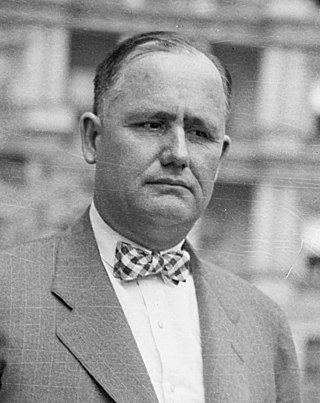
Thomas Jefferson Terral was an American attorney and the 27th governor of Arkansas, serving one term from 1925 to 1927.

John Calloway Walton was an American politician and the 5th Governor of Oklahoma, serving the shortest tenure. He was impeached and removed from office shortly into his first term. A populist member of the Democratic Party, Walton previously served as the 18th Mayor of Oklahoma City between 1919 and 1923.
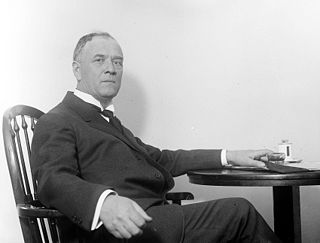
James Brooks Ayres Robertson, sometimes called J. B. A. Robertson, was an American lawyer, judge and the fourth governor of Oklahoma. Robertson was appointed by the state's first governor, Charles N. Haskell, to serve as a district judge.
A Kleagle is an officer of the Ku Klux Klan whose main role is to recruit new members and must maintain the three guiding principles: "recruit, maintain control, and safeguard."
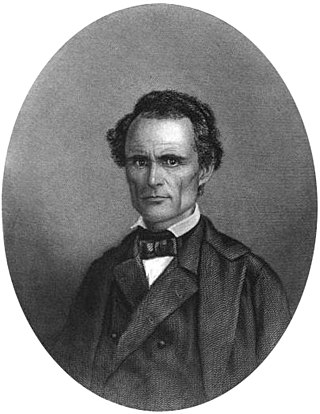
West Hughes Humphreys was the 3rd Attorney General of Tennessee and a United States district judge of the United States District Court for the Eastern District of Tennessee, the United States District Court for the Middle District of Tennessee, and the United States District Court for the Western District of Tennessee.
This is a partial list of notable historical figures in U.S. national politics who were members of the Ku Klux Klan before taking office. Membership of the Klan is secret. Political opponents sometimes allege that a person was a member of the Klan, or was supported at the polls by Klan members.

Martin Edwin Trapp was an American state auditor, governor and lieutenant governor of the U.S. state of Oklahoma. Oklahoma's third lieutenant governor, he was the first to become governor not through an election but instead due to the previous governor's impeachment and removal from office.

Rice William Means was an American soldier, lawyer, and Ku Klux Klan leader. For three years, he was a Republican United States Senator from Colorado - serving the remainder of his predecessor's term. He was defeated in the 1928 Republican primary by Charles W. Waterman on a wave of anti-KIan sentiment in the state.

The University of Tulsa College of Law is the law school of the private University of Tulsa in Tulsa, Oklahoma. For 2023, U.S. News & World Report ranked the University of Tulsa College of Law at No. 111 among all law schools in the United States. It is the only law school in the Tulsa Metropolitan Area and northeastern Oklahoma.

Louis Ray Beam, Jr. is an American white supremacist, conspiracy theorist and neo-fascist.
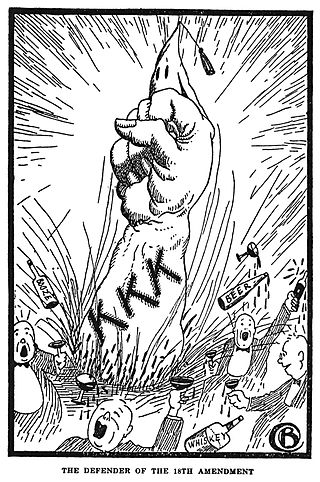
The Ku Klux Klan has had a history in the U.S. state of New Jersey since the early part of the 1920s. The Klan was active in the areas of Trenton and Camden and it also had a presence in several of the state's northern counties in the 1920s. It had the most members in Monmouth County, and operated a resort in Wall Township.
Although the Ku Klux Klan is most often associated with white supremacy, the revived Klan of the 1920s was also anti-Catholic. In U.S. states such as Maine, which had a very small black population but a burgeoning number of Acadian, French-Canadian and Irish immigrants, the Klan manifested primarily as a Protestant nativist movement directed against the Catholic minority as well as African-Americans. For a period in the mid-1920s, the Klan captured elements of the Maine Republican Party, even helping to elect a governor, Ralph Owen Brewster.
Lake Hudson, also known as Markham Ferry Reservoir, is a man-made reservoir in Mayes County, Oklahoma, United States, about 2 miles (3.2 km) northwest of Locust Grove, Oklahoma and 8 miles (13 km) southeast of Pryor, Oklahoma. It was created by the completion of the Robert S. Kerr Dam on the Grand River in 1964. It is managed by the Grand River Dam Authority (GRDA).
Leroy Magnum McAfee was an American Confederate veteran and politician. He was a member of the North Carolina House of Representatives. He later served as the inspiration for the protagonist of his nephew Thomas Dixon Jr.'s infamous 1905 play The Clansman: A Historical Romance of the Ku Klux Klan and its 1915 film adaptation The Birth of a Nation.
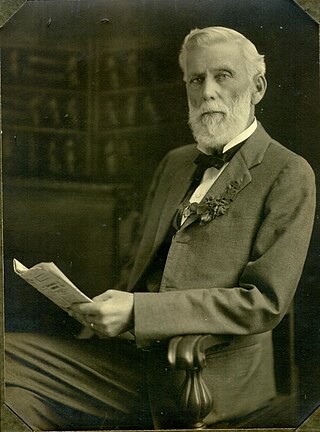
Richard Alexander Sneed was an American Confederate veteran, Klansman and politician. After serving in the Confederate States Army during the American Civil War of 1861-1865, he was a co-founder of the Ku Klux Klan chapter in Madison County, Tennessee. A Democrat, he served as the Oklahoma Secretary of State from 1923 to 1927, the Oklahoma State Treasurer from 1927 to 1931, and the Oklahoma Secretary of State again from 1931 to 1935.
Dennis William Mahon is an American far-right terrorist who is part of the radical white supremacist movement. He was indicted for the 2004 Office of Diversity and Dialogue mail bombing in Scottsdale, Arizona. Mahon is currently incarcerated at FCI Terre Haute.

Filmore Watt Daniels [sic] and Thomas F. Richards [sic] were lynched near Mer Rouge, Morehouse Parish, Louisiana by black robed Ku Klux Klan members on August 24, 1922. According to the United States Senate Committee on the Judiciary they were the 47th and 48th of 61 lynchings during 1922 in the United States. There were five lynchings in the state of Louisiana and of the 61 lynchings they were 2 of 6 white victims.
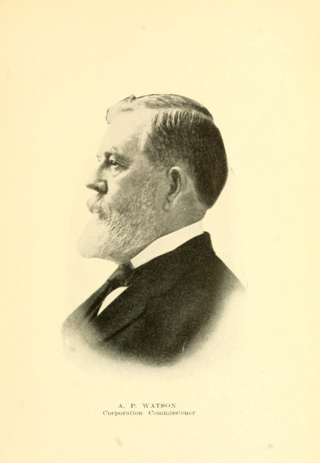
Andrew P. Watson was an American farmer, politician, and confederate officer who served as one of the first Oklahoma Corporation Commissioners from 1907 to 1915. He was frequently referred to as the "Potato King of Oklahoma" and was a member of the Democratic Party.
The Tulsa Benevolent Association was the holding company of the Oklahoma chapter of the Ku Klux Klan during the 1920s.













